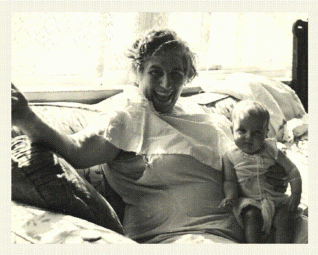Cucina Alla Nonna...
A visit to Nonna would start with a glass of fresh carrot juice for the benefit of your eyesight and general healt’. This Nonna would produce by means of an absolutely vicious, gleaming industrial juicer. So many carrots slithering down the chute, sacrificed to make just one glass of carrot juice. It was sobering. For a time conversation was limited to smiles and gestures because of the snarling of the machine. The adults would drink a little aperitivo, or cicchet as it was called, usually semi-sweet Cinzano (vemut, Nonna would call it, in her emphatic Neapolitan accent) with a slice of lemon. Various brindisi in a round: Cin cin! ’A ta salute! Cun
|
’a bona salute! or the jokey ’A faccia tua! Then it was time for the pasta al sugo. ’o Non harvested their own tomatoes and bottled his own salsa di pomodoro. He stored it in brown beer bottles in the laboratory under the house along with the stainless steel vats used to make up the De Lorenzo hair products, and the big green glass bottles with wicker covers which contained cloudy, strong red wine made from the grapes of a stubborn vine draped over the back pergola. The scent in that caverna was a mixture of tomato and peroxide. Occasionally a bottle of tomato sauce under the house would ferment and explode, and the characteristic pulpy shatter would be heard in the dining room immediately above. At these times everyone would look up quickly, raise eyebrows, nod knowingly to each other and continue with the meal.
The freshly drained pasta poured out of its oversize saucepan would give off a sudden cloud of steam and Nonna would emerge beaming and sweating from the kitchen. In a mood akin to triumph, she would whip off her top apron. Her thick grey hair, her clothes, her skin would be imbued with the tomatoey, frying smells. She always served her food on big white platters with decorated or shaped edges. The potent, tasty sugo would stain the white porcelain orangey-red. Over time, the stain seeped indelibly into the very surface of the dish, a pale but ineradicable essence.
<< Previous List All Excerpts Next >>
The freshly drained pasta poured out of its oversize saucepan would give off a sudden cloud of steam and Nonna would emerge beaming and sweating from the kitchen. In a mood akin to triumph, she would whip off her top apron. Her thick grey hair, her clothes, her skin would be imbued with the tomatoey, frying smells. She always served her food on big white platters with decorated or shaped edges. The potent, tasty sugo would stain the white porcelain orangey-red. Over time, the stain seeped indelibly into the very surface of the dish, a pale but ineradicable essence.
<< Previous List All Excerpts Next >>


